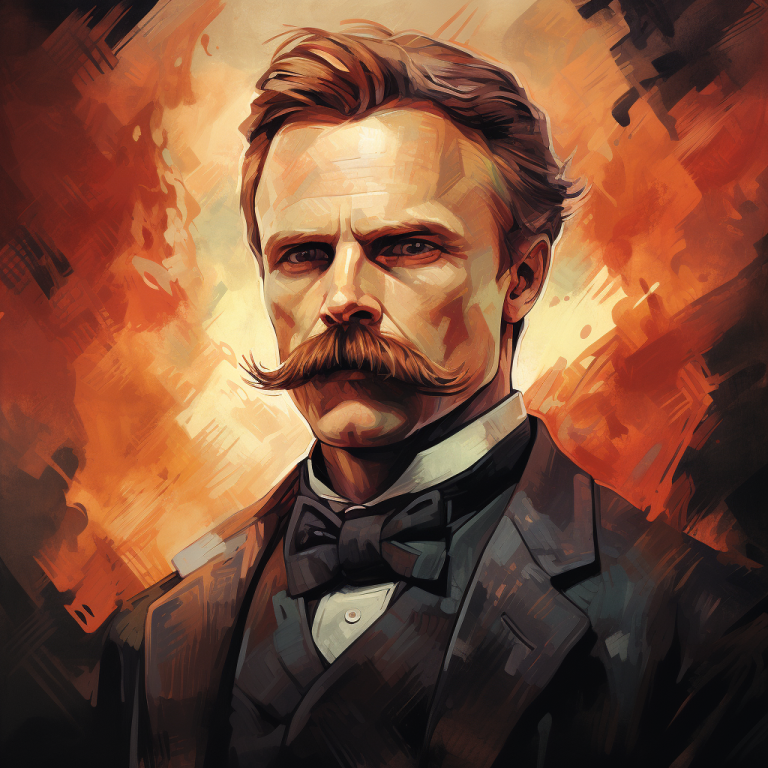
I’d like you to take a moment to imagine yourself living in perfect luxury. It’s cold outside, there’s a roaring fireplace at your feet as you sit comfortably on a couch drinking coffee and eating marshmallows. Your pet dog lies in front of the fire and your cat sits on your lap. Heavy rain hits the window, it’s an impenetrable shield from the elements, you lie back on the couch sinking into its soft upholstery and grab the remote for the extra-large TV that dominates the corner of the room.
‘Isn’t this great,’ you think to yourself as you browse through Netflix accessing list after list of entertainments undreamt of by even kings and emperors in previous ages. ‘Isn’t this the good life, the end point of all philosophy? Am I not happy? We human beings have invented happiness after hundreds of thousands of years of struggle and painful evolution. Isn’t this great?’
“‘We have invented happiness,’ say the last men, and they blink.” – Nietzsche, Thus Spake Zarathustra
Not according to Nietzsche, he would have nothing but contempt for you and declare you to be little more than an animal, a kept man, a human pet, a member of the herd, and a single, atomised Last Man cast adrift in a world without meaning, values or struggle and as far as Nietzsche is concerned, this is a terrible, terrible fate. He would decry it as the worst end that can befall, any philosopher, or indeed any human being. So, what is the last man, and why does Nietzsche find it to be so contemptable? What can you do to avoid finding oneself in the ranks of Nietzsche’s Last Men?
Nietzsche’s concept of the “Last Man” is a fascinating and thought-provoking one. It comes from his book “Thus Spake Zarathustra,” where he contrasts the Last Man with the Übermensch, or “Overman.” ‘Thus Spake Zarathustra’ is not an easy read and I would advise that you read around the book, digesting summaries from competent Nietzsche scholars before tackling it directly, it’s written in a mythopoetic style that requires thought and consideration to digest, not to mention a slight dash of Nietzschean madness to understand it in some places, some translations are easier to read and digest than others. It can be frustrating, but also illuminating to say the least. When it clicks, it clicks and that is by deliberate design. If it doesn’t click, it’s because you’re not ready for Nietzsche’s message. No wonder it didn’t sell very well when first published.
So, let us begin by imagining a society where everyone is comfortable, there’s no conflict, and all of life’s hardships are overcome. Sounds good, right? Well, Nietzsche challenges this idea. The Last Man is the epitome of this society. These individuals are characterized by their lack of ambition, their aversion to risk, and their complacency. They’re content with just being comfortable and don’t strive for anything greater. In Nietzsche’s view, this represents a sort of spiritual and existential death; the Last Man lacks purpose and depth because he is lacking in the Will to Power which Nietzsche considers to be the motiving force behind all life and human interactions. Nietzsche understood the unwritten laws of power, dominance, status, and hierarchical interactions long before any of the members of the New Left, such as Marcuse or Adorno in which we find echoes of his work.
Nietzsche uses the concept of the Last Man to criticize the trends he saw in modern society, particularly the diminishment of human spirit and the rejection of higher values. It’s a warning against what could happen if people only seek comfort and security, rather than embracing struggle, creativity, and self-overcoming.
Enter the Superman
The Übermensch, or Superman, on the other hand, is Nietzsche’s ideal. This is someone who creates their own values, lives life passionately, and constantly strives to be more than what they are. Nietzsche saw the Übermensch as the antidote to the Last Man, representing the pinnacle of human potential and achievement. The character of Zarathustra becomes Nietzsche’s own alter ego in his work ‘Thus Spake Zarathustra,’ embodying all of Nietzsche’s ideals of the Ubermensch, making every statement one of someone practicing their own ‘noble values,’ that transcends the values of the common herd, the mass of humanity who prefer comfort over discomfort, safety as opposed to risk and last but not least, mundanity over intellectual pursuits.
The last man is the comfortable man who seeks to avoid struggle or be put in any adverse circumstances that might according to Nietzsche force him to develop his character away from the common values of the herd and towards the nobility of the Ubermensch. It’s important to remember this when reading ‘Thus Spake Zarathustra,’ as the Nietzschean doctrine of overcoming through the use of the ‘Will to Power,’ is fundamental to understanding it. The doctrine of self-overcoming is a traditional part of German culture that members of other traditions may find to be strange.
The Will to Power, present in all living things seeks out its own opposition, and is always demanding challenges and obstacles to overcome, most people, the members of the herd have been trained by their ‘betters,’ and society as a whole to ignore this natural instinct for greatness for the sake of community cohesion and safety. When any man shows signs of such greatness or ‘nobility,’ as described by Nietzsche he is usually co-opted by the herd into a role that benefits it, such as a tough man, a strong man, becoming a protector by serving in the police force or military.
The last man shies away from pain! All good philosophers need pain, and Nietzsche writes extensively on this subject in the prelude to the second edition of the Joyous Science, often called the ‘Gay Science,’ apart from detailing his recent recovery from illness he goes on to say that:
“Only great pain, the long, slow pain that takes its time… compels us to descend to our ultimate depths… I doubt that such pain makes us “better”; but I know it makes us more profound… In the end, lest what is most important remain unsaid: from such abysses, from such severe sickness, one returns newborn, having shed one’s skin… with merrier senses, with a second dangerous innocence in joy, more childlike and yet a hundred times subtler than one has ever been before.” Nietzsche – The Joyous Science
Here we get a glimpse of the Nietzschean philosophy in its entirety, pain, suffering, sickness, disease, and the challenges that naturally arise in and of itself throughout life such as insecure employment, the end of relationships are not something to be avoided but are to be met full on and with deliberate intensity.
Life gives you things that you do not want, but rather than avoid this by seeking comfort we must instead do all that we can to overcome them and use them as opportunities to develop our own characters for the better. Hardships give us an opportunity to discharge the Will to Power and when successfully met make us more resourceful, wiser, and resilient and thus increasingly capable and more than ready for the next challenge that will invariably come along.
“What is good? – All that heightens the feelings of power, the will to power, power itself in man. What is bad? – All that proceeds from weakness. What is happiness? – The feeling that power increases – that a resistance is overcome.” – Nietzsche – The Anti-Christ
Likewise, sickness met full on and overcome with a return to health represent a fresh start, a birth experience that leads us to a more nuanced and joyful comprehension of life. This is a form of overcoming, to be the overman, or Ubermensch, often referred to as the superman we must always find a way of discharging our strength overcoming difficulties and obstacles that interfere with our goals and this includes seeking wellness in the midst of sickness. All things must fall before our indomitable wills, our will to power.
In Twilight of the Idols Nietzsche writes:
“Out of life’s school of war—what doesn’t kill me, makes me stronger.”
This last statement has made it into almost every type of pop culture you can think of from movies to books, and is often reworded, but now we the know the source, the phenomenal mind of the 19th Century Philosopher Friedrich Nietzsche.
So how do we avoid being the last man in modernity?
Well, this involves embracing several key principles that stand in contrast to the Last Man’s characteristics. Let’s delve into some of these ideas:
- Cultivate Purpose and Meaning: The Last Man lacks purpose and higher goals. To avoid this, actively seek out what gives your life meaning. This could be through creative pursuits, intellectual endeavours, or social causes. Engage deeply with your passions and interests.
- Embrace Challenges and Growth: Nietzsche emphasized the importance of overcoming challenges. Instead of shying away from difficulties, view them as opportunities for growth. Personal development often happens outside of comfort zones, so it’s crucial to take on new challenges.
- Create Your Own Values: The Übermensch, Nietzsche’s counter to the Last Man, creates their own values instead of passively accepting societal norms. Reflect on your beliefs and values and be willing to question and revise them. If you find that they do not serve you then you are free to drop them as the unwanted baggage that they are, forge a path that is authentically yours.
- Foster Deep Connections: In a world where superficial interactions are common, strive for deeper, more meaningful relationships. Engage in conversations and activities that are fulfilling and intellectually stimulating. I know few people, but they’re good quality people, the type of people that I could ring in the middle of the night, 3AM on a Wednesday and they’d not only answer the phone but be glad to do so.
- Pursue Excellence and Mastery: Whatever your field or interest, aim for excellence. The process of mastering a skill or subject can bring a sense of achievement and personal fulfilment that goes beyond mere comfort.
- Stay Informed and Think Critically: The Last Man is uninterested in intellectual pursuits. Stay curious and informed about the world. Engage with a variety of perspectives and think about the information you encounter. Is it right, is it wrong, why is it unpalatable, is it to your benefit or only to someone else’s?
- Balance Material Comfort with Spiritual and Intellectual Needs: While material comfort is not inherently bad, it shouldn’t be the sole focus of life. Balance these comforts with the nurturing of your spiritual, intellectual, and emotional selves. A rough camping trip will make you appreciate your bed. An hour’s meditation will refresh the mind as exercise refreshes and strengthens the body, whatever works for you, works for you, it could be a long walk in the country where you are free to think as you please, mulling over life’s mysteries and issues.
- Practice Self-Reflection: Regular self-reflection helps in understanding your motivations, desires, and actions. This introspection can guide you to live a life that aligns more closely with your true self, rather than simply following societal expectations.
We should end by saying that it takes a lot of conscious effort to avoid becoming the Last Man, it’s not easy to live a life of purpose, engagement, and self-overcoming. It’s about striving for something greater than mere comfort and security, and continually seeking to grow and evolve as an individual.

